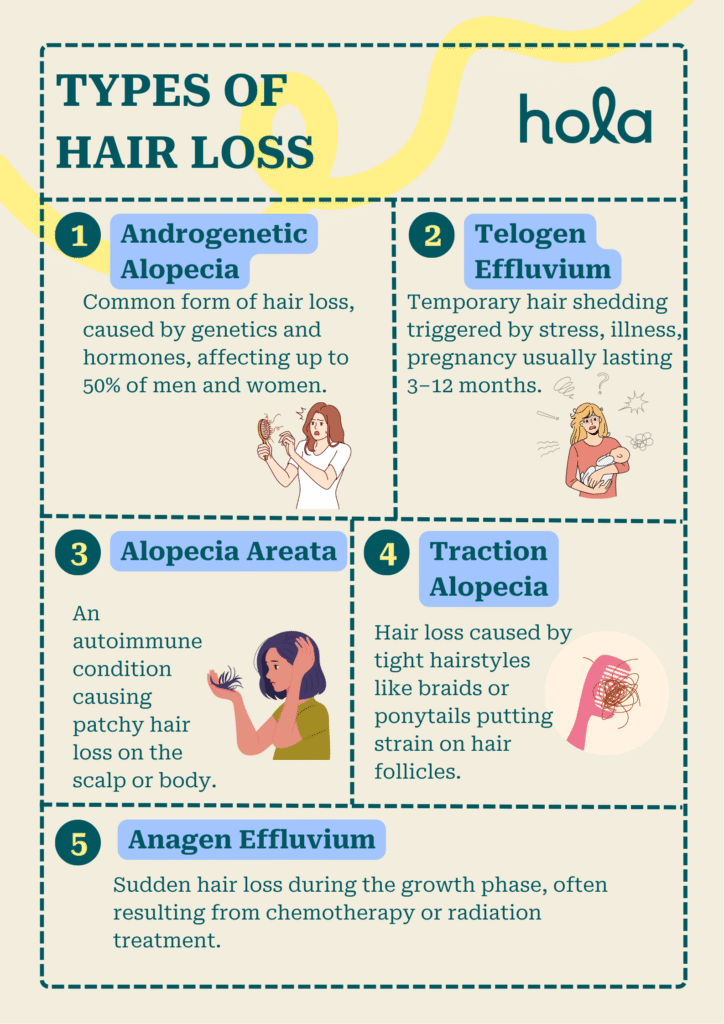Hair thinning: Can it grow back?
Written by the editorial staff writer at Hola. Medically Reviewed by Dr. Ammar AL-ANI, MBChB, CCBST, AMC.

Contents

Summary: Thinning hair can potentially regrow, depending on the underlying causes. If it’s a result of postpartum shedding, stress, or nutrient shortages, hair usually regains its fullness within 6 to 12 months with appropriate care. A nutritious diet, scalp massages, and gentle hair maintenance can facilitate regrowth. Should thinning continue, it's advisable to consult a doctor for diagnosis and treatment alternatives.
Hair thinning is one of those issues that gradually sneaks up on you, and before you realise it, you are wondering, “Can my hair even bounce back?” According to the American Academy of Dermatology Association (AADA), most people lose 50 to 100 strands of hair each day, as old hair falls out and new hair regrows for the same follicles. Whether it’s due to stress, ageing, or genetics, it’s a challenge faced by many. The good news is that despite its unsettling nature, there’s hope! Understanding the underlying causes and what can be done about them might be the secret to restoring your thick, healthy hair.
What is hair thinning?
Hair thinning refers to a gradual decrease in the thickness or volume of hair on the scalp, leading to finer, less voluminous hair. Unlike hair loss, which typically causes bald spots, thinning involves an overall reduction in thickness, making the scalp more visible. Genetics, hormonal changes, stress, ageing, and poor nutrition can contribute to this condition. It’s a common issue that affects both men and women, and although it can be worrisome, it is usually treatable or manageable depending on the cause.Common causes of hair thinning
Common causes of hair thinning include:- Genetics: Genetic hair thinning, also known as androgenetic alopecia, is the most common cause of thinning hair in both men and women.
- Hormonal changes: Thyroid disorders, pregnancy, and menopause can cause short-term or long-term hair thinning due to changes in the hormone levels.
- Nutritional deficiencies: Deficiency of key nutrients like iron, zinc, biotin, and vitamin D can affect hair condition and lead to thinning.
- Stress: Stress, whether physical or emotional, can induce telogen effluvium, a condition where numerous hair follicles enter the dormant phase, causing hair loss and reduced volume.
- Ageing: As people grow older, hair naturally becomes finer and sparser due to changes in the growth cycle.
- Poor hair care practices: Excessive use of heated hair styling tools, tight hairstyles, and harsh chemical treatments can damage hair and lead to hair thinning.
Also read: Which vitamin deficiency causes hair loss?
Feeling sick and unsure why? Speak with a GP online in 15 minutes.
Sudden vs. gradual hair loss
Sudden hair loss usually happens quickly and is often visible within a short span, such as excessive shedding or bald patches. Potential triggers may include stress, illness, side effects from medications, or conditions like alopecia areata.
Gradual hair loss progresses over time, resulting in widespread thinning of the scalp rather than patchy loss. Hereditary factors, hormonal fluctuations, and ageing generally cause it.
While sudden hair loss may indicate an underlying health concern that requires medical attention, gradual hair loss is commonly associated with genetic predispositions or age-related changes.
Types of hair loss
There are several types of hair loss, each with distinct causes and characteristics:- Androgenetic alopecia (pattern baldness): The most prevalent form of hair loss, caused by genetic factors and hormonal shifts. This condition affects up to 50% of males and females and is marked by continuous reduction of terminal hair on the scalp starting after puberty.
- Telogen effluvium: Transient hair loss caused by stress, illness, pregnancy, or medication. This condition leads to widespread hair shedding across the scalp. It usually occurs a few months after a triggering event. Talogen effluvium can last between 3 to 12 months.
- Alopecia areata: A condition where the immune system mistakenly attacks hair follicles, resulting in round patches of hair loss on the scalp or other parts of the body. Alopecia areata has a worldwide prevalence ranging from 0.57% to 3.8%.
- Traction alopecia: Hair loss due to tight hairstyles, such as braids, ponytails, or extensions, putting pressure on the hair follicles and leading to breakage.
- Anagen effluvium: Abrupt hair loss due to damage to hair during the growth stage, typically caused by chemotherapy or radiation therapy.
Also read: Postpartum hair loss: What to expect

Can thinning hair grow back?
Yes, hair that is thinning has the potential to regrow, depending on the underlying reasons. When hair loss results from stress, nutritional deficiencies, or hormonal fluctuations, it is generally a temporary condition, and regrowth occurs within 6 to 12 months. Maintaining a nutritious diet, minimising stress, and using gentle hair care products can aid in the regrowth process. Nevertheless, if thinning continues or worsens, it may suggest a more serious health issue, such as thyroid problems or androgenic alopecia, which would require medical intervention. Treatments like dietary supplements and scalp therapies might be beneficial.
What tests diagnose hair loss
Doctors utilise a range of tests to ascertain the reasons behind hair loss and identify any underlying health issues.
- Blood tests: These tests assess for iron deficiency, thyroid conditions (TSH, T3, T4 levels), vitamin deficiencies (D, B12, biotin), and hormonal irregularities (androgens, oestrogen, prolactin).
- Scalp biopsy: A small piece of scalp skin is examined under a microscope to identify scalp disorders, inflammation, or autoimmune issues.
- Pull test: In this assessment, the doctor gently pulls on a section of hair to determine how many strands come out, which helps evaluate the severity of shedding.
- Dermoscopy: A close examination of the scalp with magnification assists in diagnosing the health of hair follicles, miniaturisation, or fungal infections.
If hair loss is intense or continues, testing can guide the most appropriate treatment options.
When to seek professional advice
You should see a doctor if hair loss is severe, exhibits patchiness, or persists for more than 12 months. Red flags include visible thinning of the scalp, excessive shedding, brittle nails, fatigue, or abrupt weight changes, which may suggest thyroid disorders, hormonal imbalances, or nutritional deficiencies. If hair loss impacts your self-esteem or daily activities, consulting a medical professional can help identify the cause and the most suitable treatment approaches.
Where to get doctor’s advice
For cases of chronic or severe hair loss, multiple healthcare pathways are accessible. Primary care doctors can assess your situation, perform tests for deficiencies or thyroid problems, and refer you to a specialist when necessary. Dermatologists and endocrinologists are experts in scalp health and hormone-related hair loss, offering specific treatments. For immediate access, telehealth services like Hola Health provide virtual consultations with short waiting times. Pharmacies and walk-in clinics may also provide advice on over-the-counter remedies and supplements.
If hair loss is undermining your self-confidence or impacting your daily life, seeking medical input promptly can help clarify the cause and available treatment choices.
How can telehealth help with hair thinning?
- 24/7 access to online doctors: Book a telehealth appointment anytime to discuss hair thinning concerns without waiting for clinic visits.
- Medical certificates: If hair loss is affecting your mental health or work, request a medical certificate through telehealth.
- Online scripts: Receive prescriptions for treatments like topical solutions, supplements, or medications via secure online scripts.
- Referrals to specialists: Get an online referral to a dermatologist or hair specialist if needed.
Potential solutions and home remedies
Postpartum hair loss is usually temporary; however, specific treatments and home remedies can foster hair regrowth and enhance overall scalp health.- Balanced diet: Consuming foods rich in iron, biotin, zinc, and protein, such as leafy vegetables, eggs, nuts, and fish, can strengthen hair.
- Gentle hair care: Preventing excessive heat styling, harsh brushing, and tight hairstyles can minimise unnecessary breakage. Utilising mild shampoos and conditioners maintains the health of your hair.
- Scalp massage and essential oils: Massaging the scalp with coconut, rosemary, or castor oil can enhance circulation and stimulate hair growth.
- Stress management: Engaging in yoga, meditation, or deep breathing exercises can assist in hormone regulation and reduce hair shedding related to stress.
If hair loss continues past 12 months, contact a doctor to evaluate potential underlying deficiencies or hormonal issues.
Hair thinning can be a challenge, but it doesn’t have to be permanent! With proper treatment, care, and some patience, many people find that their hair can recover. Whether through dietary changes, stress management, or medical treatments, there are many ways to restore your hair’s health and volume.
Reference
- AADA - reference link
- National Library of Medicine - reference link
- The Australian College of Dermatologists - reference link
- National Library of Medicine - reference link
What we treat
- Cough
- Nausea & vomiting
- Fever
- Hayfever
- Fatigue
- Sore throat
- Acne
- Hair loss
- Gout
- Eczema
- Rosacea
- Sunburn
- UTI
- Erectile dysfunction
- Contraception
- Morning sickness
- Morning after pill
- Prostate health
- Anxiety
- Depression
- Stress
- Grief & loss
- Antidepressants
- Premature ejaculation
- Asthma
- Blood pressure
- Blood thinners
- Diabetes
- Cholesterol
- Migraines & headaches
- Allergies
- Body ache
- Heartburn & reflux
- Sleep disorder
- Pain relief
- Gastro
Related Articles
[the-post-grid id="43834" title="Diet/Lifestyle Single"]Disclaimer
This blog is for general informational purposes only and does not indicate that Hola Health provides all treatments or preventive measures mentioned. It is not intended to be a substitute for professional medical advice. Always seek the guidance of your doctor or other qualified health professional with any questions you may have regarding your health or a medical condition. For emergencies please immediately contact 000. Any medical topics discussed are intended to educate, not to imply availability through Hola Health.


 Facebook
Facebook  X
X  Copy Link
Copy Link
